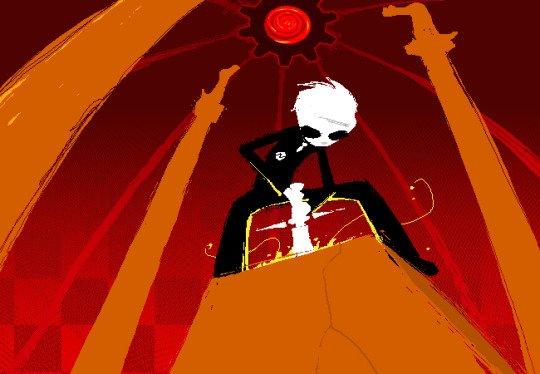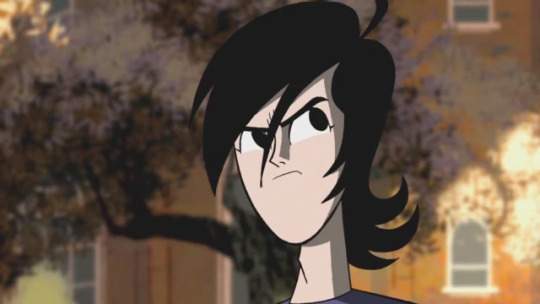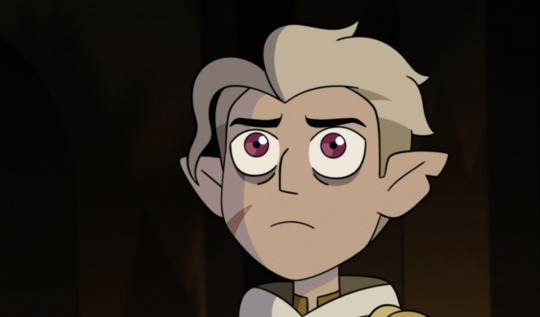#cw surface level media analysis
Explore tagged Tumblr posts
Text
Archetype Exploration: Perfect Soldiers




(Hey, please look at this blog's pinned post before reading this post; it gives a lot of context for the lens I'm looking at these characters through, k thx. also, shoutout to @finalgirl-nihilbliss for guessing the archetype)
CW: Abuse, Projection, Surface-Level Media Analysis
If your comfort character exhibits any of the following symptoms:
constant brooding
face frozen in a perpetual scowl
possession of a "dark past" they don't like to talk about
frequent blank stares into the middle distance
constantly trains for something uncertain
You may have just found yourself in the presence of a Perfect Soldier.
Perfect soldiers are characters who were groomed, often from birth, for the sole purpose of inflicting harm on their fellow man. These characters are efficient, tactically-minded, and above all else, violent. Perfect soldiers will often excel at combat and strategy, but struggle with emotional sensitivity.
Note that just because these characters are violent and closed off now doesn't mean that this is their natural temperament. Often, perfect soldiers have some kind of natural compassion that was stomped out through years of abuse training. This can come in the form of a sole loved one who tragically died, but more often than not, it simply manifests as a soft side sanded away.
If the Perfect Soldier doesn't start that way, who is to blame for their transformation? In sci-fi and fantasy, this transformation is usually caused by a morally corrupt institution built to churn out perfect soldiers (the Jedi Academy, the Galalunan Military Academy, the Space Marine Legions, etc.). Other times, perfect soldiers are groomed raised by a cruel and abusive father figure (Endeavor, Bro Strider, Belos, etc.). Some settings even blend the two by having an institution with a twisted general (think Shadow Weaver from She-Ra).
Typically, if a perfect soldier has a character arc, it's usually one of healing and letting go of their anger. This almost always contains at least two of these three steps in the order of your choosing:
The perfect soldier leaves the institution of their torment, either by circumstance or by excommunication. Once on the outside, they'll typically find that their raw might is irrelevant to their survival, and they'll instead need to rely on their lacking social skills. This exit from the comfort zone will prompt the soldier to learn a lot of people skills, typically leading to a "softening up" of sorts. Note that this doesn't have to be a literal escape from a physical place. Rather, it could just be a character being outside their guardian's zone of influence.
The perfect soldier discovers some imperfection with their guardian/institution. Perhaps there's some kind of inconsistency in its moral values. Other times, the soldier finds a secret the guardian/institution has been covering up. Whatever it is, this will prompt the soldier to question their leaders' infallibility.
The perfect soldier meets a person who shows concern for them in spite of the soldier's outward hostility. This outside party will likely witness or hear about the perfect soldier's tumultuous upbringing and take pity on them. This will likely prompt an attempt to reach out to the soldier, something which may or may not be rejected. Whatever the case, this act compassion will likely stick with the soldier, and prompt them to think about their own worth.
An arc like this usually resolves with a direct confrontation with the abusive mentor(s) who turned them into a weapon of war. If the soldier is a member of the supporting cast, this may come in the form of some heroic self-sacrifice, usually to protect the aforementioned outside party. Alternatively, if the soldier is a protagonist, their confrontation will likely be much more active, and may even be a proper fight. The soldier tends to win this fight either with the power of friendship or compassion but this isn't a strict requirement. If the writers really want to get spicy with it, they might even spare their tormentor, really leaning into the idea of abandoning violence (note that this runs the risk of coming off as a "forgive your abusers" narrative).
Alternatively, the lack of a grand confrontation can be a form of narrative resolution in and of itself. Living well is the best revenge, after all, and showing that our former perfect soldier has moved on to a happier, more peaceful life can be a far stronger statement of growth than a glitzy fight to the death.
(This is the part where I tie this whole thing back into the gimmick of the account. If you just wanted a Trope Talk style summary of the archetype, you've seen all there is to see. Thanks for reading, and don't forget to do your daily clicks.)
Why do you keep submitting this?
So, out of all the characters that I've seen submitted, this is easily the most prolific character archetype. At the time of writing, somewhere between 40-50 characters that have been posted roughly fit this archetype, and that's not including any of the characters I haven't posted yet.
Why do submitters connect this particular trope with trans women so damn much?
Firstly, it's important to consider that in most western fiction, the soldier is an inherently masculine archetype. From the classical epics of the Odyssey and the Iliad, to the superheroes and action stars of modern-day blockbusters, there's a very real conflation between a character's manhood and a character's capacity to do violence. A lot of mainstream military propaganda does the same, suggesting that men who enlist are more "authentically masculine" than those who don't. This archetype serves as a critique of that idea; it shows us that this masculine ideal can be, and often is, a soul-crushing experience. In a sense, the idea of transitioning serves as an escape from this image.
Furthermore, it's important to consider what this character arc is actually about: a miserable character discovering that a better life is possible, and making steps to achieve personal peace. Often, these characters are fiercely loyal to the institutions that take advantage of them. These characters are often fine with it because they can't conceive of a better world. Once that's presented to them, that's when they start to leave. Frankly, given that a lot of people still don't end up knowing about trans folks until they're adults, I'm surprised more trans people don't connect to characters like this.
Finally, this arc gets back to the core question at the center of this blog: could transition have saved her? The archetype, in its construction necessitates a level of misery, ergo it implies that the character needs saving. It's no wonder these characters tend to garner a lot of Hurt/Comfort fanfic (Anakin Skywalker alone has more Hurt/Comfort fic than some of my favorite fandoms period). There's an inherent desire for these characters have better lives, and maybe some estrogen could do it.
This is my best guess, anyway. If you have thoughts, feel free to share them.
#archetype exploration#trope analysis#cw abuse#cw projection#cw surface level media analysis#transgender#sorry for taking so long to finish this post#i've been trying to phrase it as delicately as possible
157 notes
·
View notes
Text
I just automatically assumed this was a dry joke, because of how obviously absurd that statement is.
I don't like to be snobby about TV - as pretentious as the writing on this blog is, I think that all kinds of shows have their value. A view of media that takes only a narrow, specific list of shows/films as worthy of Serious Analysis (and that list is usually solely informed by the sensibilities of straight white cis men), is pretty reductive and misses the value that can be found in all kinds of media. But Buffy is very clearly a show with artistic purpose. It's not always perfect, or even adequately successful, but it is always trying to do something, for some kind of value on a thematic or character level. Without wanting to sound like a Rick and Morty copypasta, it was always trying to say something of import. It used metaphor, symbolism, parallels, cultural references, and other techniques that go beyond the surface level to make these points. It was a show with substance.
Without wanting to bash The Vampire Diaries, or other CW shows - I watched several seasons of TVD back in the day and even enjoyed some parts of it - it's very clearly not that. It's not a show that plans character arcs over multiple seasons. It doesn't do things for a specific thematic purpose. It doesn't deal with symbolism or foreshadowing or metatextuality. As Nicholson said herself, it exists so that people can enjoy hot fictional monster boyfriends, and also to sell Hyundais. It doesn't plan anything for artistic aspiration, it just reacts to whatever's popular with the fans and whether or not they got renewed. And there's nothing wrong with that - there's a certain skill involved in making memorable fictional monster boyfriends. But it's very clearly working on an entirely different level to Buffy.
Buffy obviously uses a lot of tropes common to YA fiction, and it didn't invent all of them. Angel and Spike for example are not entirely not hot monster boyfriends. Their decisions in building the cast was indeed influenced by fan reactions (e.g. Spike sticking around a lot longer that originally planned). But there was ambition beyond just existing. The writers in Buffy generally approached each season and episode with thoughtfulness and a vision in mind. So it just bugs me when people compare Buffy to something like The Vampire Diaries, or even the slightly more purposeful Supernatural, which by the end existed largely just to produce content. Buffy is still spawning blogs, video essays and academic writings analysing it. I don't see The Vampire Diaries doing that in 20 years.
I don't mean to frame this like "how dare you compare the flawless and sacred Buffy to these silly inferior shows", it's just that they clearly did not have the same ambitions. It's fruitless and self-defeating to even try and compare something that does have an artistic vision and thematic statements to make with something that simply does not. They're trying to achieve wildly different things. To categorise Buffy alongside alongside The Vampire Diaries is to do it a disservice. It is its own kind of snobbery to assume Buffy belongs in the same category as something like The Vampire Diaries, as if it being a supernatural teen drama means it should be judged against other junk-food shows of little deep meaning, rather than against the kind of Serious shows that win Emmys. In its ambition, Buffy is much closer to the latter.
just watched jenny nicholson’s 2.5 hour video on tvd and it was all valid and funny and whatnot but i genuinely can’t get over how she unironically said that tvd is better than buffy without even attempting an explanation
37 notes
·
View notes
Text
AAAAAAA HES HERE!
Archetype Exploration: Perfect Soldiers




(Hey, please look at this blog's pinned post before reading this post; it gives a lot of context for the lens I'm looking at these characters through, k thx. also, shoutout to @finalgirl-nihilbliss for guessing the archetype)
CW: Abuse, Projection, Surface-Level Media Analysis
If your comfort character exhibits any of the following symptoms:
constant brooding
face frozen in a perpetual scowl
possession of a "dark past" they don't like to talk about
frequent blank stares into the middle distance
constantly trains for something uncertain
You may have just found yourself in the presence of a Perfect Soldier.
Perfect soldiers are characters who were groomed, often from birth, for the sole purpose of inflicting harm on their fellow man. These characters are efficient, tactically-minded, and above all else, violent. Perfect soldiers will often excel at combat and strategy, but struggle with emotional sensitivity.
Note that just because these characters are violent and closed off now doesn't mean that this is their natural temperament. Often, perfect soldiers have some kind of natural compassion that was stomped out through years of abuse training. This can come in the form of a sole loved one who tragically died, but more often than not, it simply manifests as a soft side sanded away.
If the Perfect Soldier doesn't start that way, who is to blame for their transformation? In sci-fi and fantasy, this transformation is caused by a morally corrupt institution built to churn out perfect soldiers (the Jedi Academy, the Galalunan Military Academy, the Space Marine Legions, etc.). Other times, perfect soldiers are groomed raised by a cruel and abusive father figure (Endeavor, Bro Strider, Belos, etc.). Some settings even blend the two by having an institution with a twisted general (think Shadow Weaver from She-Ra).
Typically, if a perfect soldier has a character arc, it's usually one of healing and letting go of their anger. This almost always contains at least two of these three steps in the order of your choosing:
The perfect soldier leaves the institution of their torment, either by circumstance or by excommunication. Once on the outside, they'll typically find that their raw might is irrelevant to their survival, and they'll instead need to rely on their lacking social skills. This exit from the comfort zone will prompt the soldier to learn a lot of people skills, typically leading to a "softening up" of sorts. Note that this doesn't have to be a literal escape from a physical place. Rather, it could just be a character being outside their guardian's zone of influence.
The perfect soldier discovers some imperfection with their guardian/institution. Perhaps there's some kind of inconsistency in its moral values. Other times, the soldier finds a secret the guardian/institution has been covering up. Whatever it is, this will prompt the soldier to question their leaders' infallibility.
The perfect soldier meets a person who shows concern for them in spite of the soldier's outward hostility. This outside party will likely witness or hear about the perfect soldier's tumultuous upbringing and take pity on them. This will likely prompt a attempt to reach out to the soldier, something which may or may not be rejected. Whatever the case, this act compassion will likely stick with the soldier, and prompt them to think about their own worth.
An arc like this usually resolves with a direct confrontation with the abusive mentor(s) who turned them into a weapon of war. If the soldier is a member of the supporting cast, this may come in the form of some heroic self-sacrifice, usually to protect the aforementioned outside party. Alternatively, if the soldier is a protagonist, their confrontation will likely be much more active, and may even be a proper fight. The soldier tends to win this fight either with the power of friendship or compassion but this isn't a strict requirement. If the writers really want to get spicy with it, they might even spare their tormentor, really leaning into the idea of abandoning violence (note that this runs the risk of coming off as a "forgive your abusers" narrative).
Alternatively, the lack of a grand confrontation can be a form of narrative resolution in and of itself. Living well is the best revenge, after all, and showing that our former perfect soldier has moved on to a happier, more peaceful life can be a far stronger statement of growth than a glitzy fight to the death.
(This is the part where I tie this whole thing back into the gimmick of the account. If you just wanted a Trope Talk style summary of the archetype, you've seen all there is to see. Thanks for reading, and don't forget to do your daily clicks.)
Why do you keep submitting this?
So, out of all the characters that I've seen submitted, this is easily the most prolific character archetype. At the time of writing, somewhere between 40-50 characters that have been posted roughly fit this archetype, and that's not including any of the characters I haven't posted yet.
Why do submitters connect this particular trope with trans women so damn much?
Firstly, it's important to consider that in most western fiction, the soldier is an inherently masculine archetype. From the classical epics of the Odyssey and the Iliad, to the superheroes and action stars of modern-day blockbusters, there's a very real conflation between a character's manhood and a character's capacity to do violence. A lot of mainstream military propaganda does the same, suggesting that men who enlist are more "authentically masculine" than those who do. This archetype serves as a critique of that idea; it shows us that this masculine ideal can be, and often is, a soul-crushing experience. In a sense, the idea of transitioning serves as an escape from this image.
Furthermore, it's important to consider what this character arc is actually about: a miserable character discovering that a better life is possible, and making steps to achieve personal peace. Often, these characters are fiercely loyal to the institutions that take advantage of them. These characters are often fine with it because they can't conceive of a better world. Once that's presented to them, that's when they start to leave. Frankly, given that a lot of people still don't end up knowing about trans folks until they're adults, I'm surprised more trans people don't connect to characters like this.
Finally, this arc gets back to the core question at the center of this blog: could transition have saved her? The archetype, in its construction necessitates a level of misery, ergo it implies that the character needs saving. It's no wonder these characters tend to garner a lot of Hurt/Comfort fanfic (Anakin Skywalker alone has more Hurt/Comfort fic than some of my favorite fandoms period). There's an inherent desire for these characters have better lives, and maybe some estrogen could do it.
This is my best guess, anyway. If you have thoughts, feel free to share them.
157 notes
·
View notes